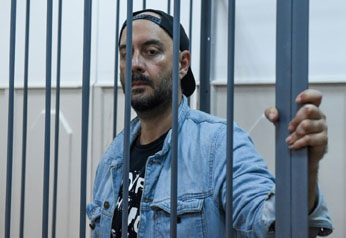MOSCOW, May 8, 2018 (BSS/AFP) – Under house arrest since August last year, Russian theatre and film director Kirill Serebrennikov will miss the Cannes Film Festival this week, where his film “Leto” or Summer is competing for the prestigious Palme d’Or prize.
The film tells the story of Soviet-Korean rock legend Viktor Tsoi, whose songs are seen in Russia as anthems of the late 1980s Perestroika era.
Serebrennikov edited the film under house arrest after he was arrested on embezzlement charges he dismisses as “absurd.” The case, which many see as political, has sent shockwaves through Moscow’s culture circles.
The 48-year-old has revolutionised Moscow’s theatre scene with radical stagings of new plays and reinvented classics. He has also staged ballets and an opera at the legendary Bolshoi theatre.
As a film director he has received critical acclaim, winning prizes at the Cannes and Rome film festivals while his 2012 film “Betrayal” was nominated for the prestigious Golden Lion at Venice.
– ‘Socially conscious’ director –
Serebrennikov was born in Rostov-on-Don, a southern Russian city of a million people not far from the border with Ukraine.
“Everything is possible in a southern city. Even murder in the name of love,” he said about his hometown in an interview with Russian Snob magazine in 2008.
He moved to Moscow in the early 2000s and quickly found fame in the capital.
In 2012, the Moscow city government’s liberal culture minister Sergei Kapkov appointed Serebrennikov to head a small failing state-run theatre.
Serebrennikov turned the venue, now known as the Gogol Center, into one of Moscow’s best theatres and a favourite spot for the capital’s liberal intelligentsia.
But his appointment and work there angered cultural conservatives. For many, Serebrennikov’s frequent use of on-stage nudity and obscene language as well as modern adaptations of Russian classics were a step too far.
“There was a battle against him ever since he took over the Gogol Center,” said John Freedman, a Moscow-based expert on contemporary Russian theatre.
He does not classify Serebrennikov’s work as political, but rather as “socially conscious”.
Authorities could have scapegoated another director, Freedman said, but it was Serebrennikov’s personal links to high-placed officials — including to President Vladimir Putin’s advisers — that, ironically, made him vulnerable.
“He received huge grants and was personally close to Putin’s advisers,” Freedman said, adding many warned Serebrennikov not to get too close to Russia’s power circles.
“If you get too close to the sun, your wings get burnt.”
– Scandal at the Bolshoi –
Russian conservatives were further outraged when Serebrennikov was allowed to direct a ballet about legendary gay Soviet dancer Rudolph Nureyev at the Bolshoi.
Nikita Mikhalkov, a powerful Oscar-winning film director with close Kremlin links, said Serebrennikov should not be allowed “to hang Nureyev’s cock” in the country’s most important theatre.
This was a reference to the production’s use of a famous full-frontal nude photograph by Richard Avedon.
The Bolshoi initially cancelled the premiere of “Nureyev” at the last minute, an unprecedented move, while Serebrennikov was already under questioning in a criminal probe.
When the ballet finally premiered, it was given a standing ovation from the audience, which included much of Russia’s political elite.
“This is a man who can direct a ballet about Nureyev and a play featuring the (Russian) rapper Haski at the same time,” said Michael Idov, a Russian-American screenwriter who wrote the screenplay for “Summer” with his wife Lily.
– A ‘catastrophic’ atmosphere –
Idov was on the set of “Summer” in Saint Petersburg when Serebrennikov was arrested by security forces in Moscow.
“It was a complete shock to everyone,” he told AFP.
Last week, a Moscow court extended Sebrennikov’s detention for another three months. Another court refused to move the former managing director of Serebrennikov’s theatre company from a prison cell to house arrest.
Freedman calls the atmosphere in Moscow theatre circles following the arrests of Serebrennikov and his associates “catastrophic”.
“There is a sense that this case has already been decided by somebody at the top and that they will go to jail,” he said.
Idov said he had hoped Serebrennikov would be allowed to go to Cannes to present the film based on the life of the director’s childhood hero.
“Hell, I still hope, against all reason, that this will somehow happen,” he said.
“It’s his film and it should be his triumph.”



